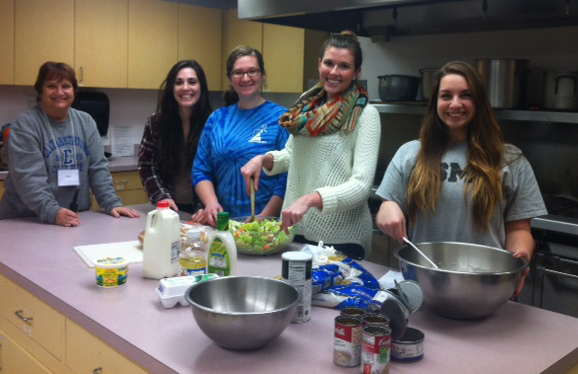 In the first week the Shelter was open, a few guests spent the night. Then a few more showed up. And a few more. Today, the Elizabethtown Ministerium Winter Shelter regularly houses a number of guests who, for various reasons, have no another place to call home.
In the first week the Shelter was open, a few guests spent the night. Then a few more showed up. And a few more. Today, the Elizabethtown Ministerium Winter Shelter regularly houses a number of guests who, for various reasons, have no another place to call home.
Opened in December 2015, the Shelter, located in the basement of St. Paul’s United Methodist Church on North Locust Street, is a place where those in the community who are “homeless or in need of shelter have a safe, warm and dry place to go,” explained Olivia Heldmann, a Elizabethtown College social work major.
Heldmann, a senior, has been volunteering at the Shelter since it opened.
“It’s become much more organized since then,” she said. Churches, civic organizations and individuals have donated funds and items such as sheets, blankets, towels. The Lancaster County Council of Churches donated their old floor mats after they got new ones.
Though she has learned about organizational structure in her classes at E-town, Heldmann has been able to see, firsthand, how everything has fit together and fallen into place. “The community organized itself,” she said. “To see it in action was pretty cool.”
The Shelter is a collaborative effort between area churches, volunteers and the Community Cupboard, which supplies some of the Shelter’s food. It’s open overnight from 7:30 p.m. to 8 a.m. and will continue to service the community until the end of March.
“Churches in the area have been trying to organize a shelter of sorts for the past year and a half,” said Janice Davis, administrative assistant in E-town’s Department of Biology. Davis is wife to St. Paul’s senior pastor, the Rev. Skip Davis. They are co-coordinators of the Shelter. Peggy McFarland, from the College’s Department of Social Work, and Deb Jones of Community Cupboard are involved in intake.
The concept of a shelter crystalized this winter when the churches noticed a uptick in need.
Members of area churches worked with volunteers to get something started. “It mushroomed,” Davis said. “The community came together—churches, neighbors and students … . Everyone has their own talent to offer. Their ministry, their profession, their connections. …”
Late last fall, Heldmann heard from the College’s Social Work Student Association, that the Shelter needed volunteers. She wasn’t going home over Winter Break because of her internship with the County of Lancaster, so she signed up for training.
She went to shelter in the evening after working her internship in Lancaster, she said. “The guests are so appreciative. You hear their stories and some of the wisdom they have. Talking to them is really cool, especially the older ones.”
Heldmann also liked the idea of interacting with people who aren’t in social work, who have their own full-time jobs, but are willing to give their time toward the community.
Volunteers—100-plus and counting—must first participate in a two-and half-hour training session run by Davis. They discuss confidentiality and dignity and the reasons people might need a shelter—“there are a lot of people who are one paycheck away from homelessness,” Heldmann said. “In social work you learn how to appreciate diversity. You learn to respect. Many of these people have not been handed easy circumstances.”
Overnight volunteers arrive at the Shelter by 6:30 p.m., and the doors open at 7:30. Those who give their time include members of E-town churches retirees, community members, folks from Masonic Village, Elizabethtown College occupational therapy and social work students … and professors—most of the biology department volunteers, Davis said.
Once they go through a security check, guests head to the church basement. They eat dinner, shower and settle in for the night. Each guest is given fresh sheets, towels, toiletries and a floor mat for under their mattress.
The meals, prepared by volunteers from local churches, have included full turkey dinners, Stromboli and chicken noodle soup. “There’s always a big range of snacks, too,” Heldmann noted. Salads, fruit, juice and the makings for PB&J.
In the morning, the guests leave the shelter by 8. They may return in the evening.
The volunteers felt bad asking guests to leave after they’d stayed the night, said McFarland, a member of Elizabethtown Church of the Brethren, so the churches took on the additional responsibility of creating a daytime location to help close the gap in assistance. It opened in mid-February.
“Christ Lutheran Church provided this wonderful A-frame” behind the church, McFarland said. If the guests have no other daytime destination, they can stay there from 10 a.m. to 2 p.m. for a hot lunch and conversation. “Hoss’s donates food.”
Junior social work students, as part of their studies, volunteer an hour or two each week at the Day Center. “They learn in classes about life planning and exploring resources,” McFarland said. “This gives them real-world learning.”
The Day Center, open only to guests of the overnight Shelter, also closes in March. “Right at this point,” McFarland said, “it’s just for winter.”
Next year, the group hopes to expand their efforts.
“We are trying to nurture and care for individuals and help them find their own strength to stand on their own feet and become independent,” said Davis. “To stand on their own feet and get their own place.
“The overarching goal is to get them into housing.”

